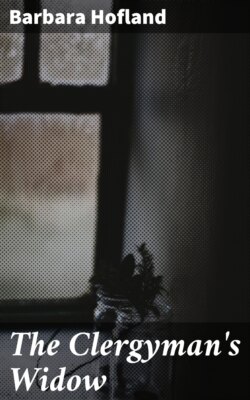Читать книгу The Clergyman's Widow - Барбара Хофланд - Страница 6
На сайте Литреса книга снята с продажи.
CHAPTER III.
ОглавлениеTable of Contents
When the first emotions of pity and regret were subsided, Mr. H—— endeavoured to fulfil the wishes of the departed, by examining the few effects he had desired to be sent to his widow, and arranging his funeral, which he determined should be at his own expence. He likewise felt it a painful duty to write to poor Mrs. Gardiner as soon as possible—a task of severe suffering to a mind of sensibility, especially in the circumstances under which she stood. This letter he enclosed in one to the young man who was Mr. Gardiner's curate at the time of his decease, and who resided in the house with the family. These melancholy duties occupied the next day: on the evening of the following, he prepared to follow the corpse of the man, so late a stranger to him, to the house appointed for all living. When he reflected on the shortness of their acquaintance, and how much it had comprised, he was forcibly struck with the last words of the departed, and felt as if he had been indeed an instrument, in the hands of an All-wise Disposer, to bless and protect his servant. He saw clearly, that in every situation the goodness of God can consistently raise up help for those that trust in him; and he rejoiced in having been the means of comfort to one so uncommonly worthy to receive it. This sensation was still farther increased, when, on looking over the deceased's pocketbook for his commands respecting his interment, he saw many passages respecting himself, addressed to Mrs. Gardiner—such as these:—
'Oh, Maria! I have got a good and tender nurse, such as only thy love could exceed: let this be thy comfort when I am in the dust—tell my girls that this young man fulfils all their duties, and is unto me even as a daughter.'
'Help me, my dear wife, to thank Him who, in the midst of judgement remembereth mercy, and hath sent me a friend in a strange land. Assure yourself that I am surrounded with comforts; the tedium of my languid state is assuaged by the intelligence of my young friend, and my sufferings soothed by his kindness,' &c. &c.
From the contemplation of these effusions of a devout and tender heart, Mr. H—— was obliged to tear himself for offices of a different nature. The people of the house not only refused positively to assist in paying the last duties to the body of a heretic, but with contradictory stubbornness, insisted on its immediate removal. He was therefore under a necessity of entreating the British consul to suffer his own English servants to convey the good clergyman to his grave. They came, accompanied by the chaplain, who preceded them, while H——, the one only mourner, slowly followed the venerated clay. As they passed through the gate where so lately those lips, now cold and pale, had uttered the language of inspiration in the voice of hope—that eye, now closed for ever, had beamed with the triumph of faith and anticipated immortality, he felt the full value of that religion which looks beyond the grave, and he felt grateful that he had seen its effects so fully and happily exemplified. But while he stood at this last receptacle, where there were only the two men who bore the body, the chaplain, and himself, he could not help contrasting the forlorn attendance of the funeral with what it would have been in the beloved pastor's own country, surrounded by the flock he had so long fed with the doctrines of life; he felt as if he should have had a mournful satisfaction in witnessing the heartfelt tribute of their tears, and knowing that his little ones had wept over the ashes of their father. He deprecated the cruel folly of sending a man in a hopeless disorder from the bosom of a family, then most endeared to him, to seek among strangers for comforts rarely found, and which no change of air, or benefit of climate, can supply. The prayer excited by this mournful contemplation was answered to this excellent young man: in about three years, he too fell a victim to consumption; but his sufferings were soothed by a wife and mother tenderly, beloved, in whose arms he at length expired. Surely we may say—'The blessing of the stranger was upon him.' 'The Lord remembered him in the day of trouble.'
